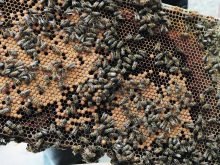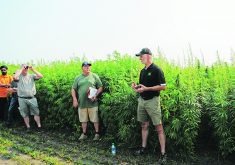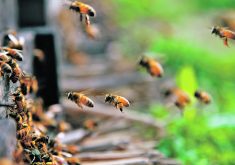WINNIPEG — A company from B.C. and researchers working in Saskatchewan are leading the global fight against varroa mites, parasites that attack honeybees.
Nature Recombined, a firm from Port Coquitlam, has developed a natural product, branded as ApiSave, that protects bees against varroa mites and diseases like American foulbrood.
The product is now being tested for efficacy and safety and the hope is that ApiSave will provide an alternative solution for beekeepers who struggle to keep varroa mites in check.
Read Also

Trump’s tariffs take their toll on U.S. producers
U.S. farmers say Trump’s tariffs have been devastating for growers in that country.
“The bee commissions are all over us. They love what we’re doing,” said Russ Crawford, a spokesperson for Nature Recombined.
Canola growers, blueberry growers, Canadian universities and others are also supporting efforts to get the product to market.
“The Alberta Beekeepers Commission see this work (the development of ApiSave) as critical to the longer-term health of honeybees and the sustainability of Alberta’s commercial beekeeping industry,” said Connie Phillips, executive director of the Alberta Beekeepers Commission, on the ApiSave website.
Crawford said the antimicrobial plant extract has more than a 99.9 per cent efficacy rate against American foulbrood and European foulbrood, and 68 to 80 per cent efficacy against varroa mites, farmtario.com reported this spring.
Varroa mites are relatively large, external parasites that attach themselves to honeybees, feeding on their body fluids.
The parasites weaken bees, making them more vulnerable to viruses, and represent a major threat to bee colony health. Hives infested with varroa mites are less likely to survive the winter.
Apivar is the only miticide on the market to control varroa, but mites may be developing resistance to the product.
Nature Recombined has been testing ApiSave in Mexico because the warm climate allows researchers to conduct two seasons of testing in one year.
Besides proving that it works, the company must confirm it is safe for bees and the environment.
“The ApiSave product needs some higher regulatory approvals as either a natural health product or a veterinary health product or a drug,” Crawford said. “Those (approvals) take anywhere from two to 10 years.”
While Nature Recombined gathers the necessary data, another project on varroa mites is underway Saskatchewan.
Medhat Nasr, a honeybee expert and former provincial apiculturist in Alberta, has been working with the Saskatchewan Beekeepers Development Commission to test miticides already commercialized and used to control mites in various crops, to see if those products can be effective against varroa mites.
The products are strips placed outside a beehive. A bee walks across them and carries the chemical into the hive, delivering it to the mite.
“We have to have efficacy and safety data to make sure there are no side effects (from) this product,” Nasr said in 2023.
Getting varroa-control products to market is needed soon by beekeepers and the farmers who depend on bees to pollinate their orchards, berries or almond crops.
“It’s a matter of getting the story out there and creating some awareness (around) the urgency of the problem,” Crawford said.
“The synthetic solutions to treat some of these (bee health) problems are becoming less and less effective.”
















